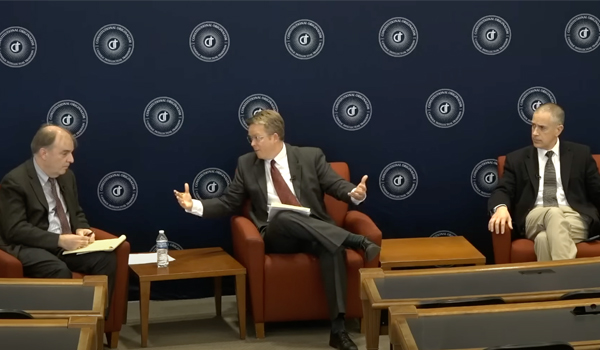 The explicit embrace of constitutional traditionalism by the Supreme Court of the United States may appear novel, but in reality it has deep roots in jurisprudence. Such was the consensus Thursday, March 16, 2023, at the spring semester’s fifth speaker event hosted by the Project for Constitutional Originalism and the Catholic Intellectual Tradition (CIT) at The Catholic University of America Columbus School of Law (Catholic Law). Moderated by CIT Co-Director Kevin Walsh, Knights of Columbus Professor of Law and the Catholic Tradition, Catholic Law, the lecture featured Marc O. DeGirolami, Cary Fields Professor of Law, St. John’s University School of Law, in discussion with Ernest A. Young, Alston & Bird Professor of Law, Duke University School of Law. Entitled “The Role of Tradition in Constitutional Law”, the event showcased the methodology of jurisprudential traditionalism, its fundamental features, and its potential future influence over the American court system.
The explicit embrace of constitutional traditionalism by the Supreme Court of the United States may appear novel, but in reality it has deep roots in jurisprudence. Such was the consensus Thursday, March 16, 2023, at the spring semester’s fifth speaker event hosted by the Project for Constitutional Originalism and the Catholic Intellectual Tradition (CIT) at The Catholic University of America Columbus School of Law (Catholic Law). Moderated by CIT Co-Director Kevin Walsh, Knights of Columbus Professor of Law and the Catholic Tradition, Catholic Law, the lecture featured Marc O. DeGirolami, Cary Fields Professor of Law, St. John’s University School of Law, in discussion with Ernest A. Young, Alston & Bird Professor of Law, Duke University School of Law. Entitled “The Role of Tradition in Constitutional Law”, the event showcased the methodology of jurisprudential traditionalism, its fundamental features, and its potential future influence over the American court system.
“I have the sense that, bit by bit, the court is coming to this method self-consciously,” opined DeGirolami in his opening statement. The fundamental features of this traditionalism, per his estimation, include a focus on concrete practices, be they cultural, political, or regulatory; a consideration of such practices’ endurance, specifically in terms of their age, longevity, and broad adoption across legal systems; and a strong presumption that these practices have meaning. Yet he noted later that traditionalism is no monolith. Traditionalists think in terms of time; and, while some dismiss jurisprudential practices developed after the ratification of the Constitution, others account for them. Traditionalism in some sense then is distinct from originalism. Even so, DeGirolami insists that its influence on the court is growing steadily: “My sense is that it’s going to be here for years to come.”
Are there limits to traditionalism, even if its influence is rising? Young certainly believes so. “Traditionalism tends to smooth out constitutional change,” he remarked in his own opening statement. Softly celebrating that in this instance he was not the only traditionalist on stage, he presented what he considered the weaknesses of traditionalism, clarifying in the process that he was in no way supporting its rejection but rather proposing that its adherents wrestle with its shortcomings. “Traditionalism is opposed to revolutionary change,” he elaborated. Reconciling it with constitutionalism is difficult, he said, because the Constitution itself is a product of revolutionary change, the revolt against British rule in the Thirteen Colonies.
At this point, Walsh intervened with a series of questions. Following an inquiring about the accuracy of referring to traditionalism as a methodology, his second question spurred a consensus between the two visiting interlocutors. “How does a traditionalist approach the subject of landmark cases?” asked Walsh. For Young, the answer lies in how traditionalists recognize the indeterminacy of precedent. For DeGirolami, the solution requires looking beyond the precedent itself, to the point of evaluating how traditional the precedent that grounds the landmark ruling might be. “A traditionalist precedent that is interpreting traditionally has a different sort of weight than a non-traditionalist interpreting precedent,” he remarked. And, as the discussion’s focus returned to contemplating the best methods for defending tradition, he reflected on how that solution mirrors traditionalism as a whole: “That’s the value, to me, of traditionalism—that it instantiates certain constitutional virtues, to which we can only have access through the working out of tradition.”
CIT aims to explore the intersection of, and the connection between, the intellectual tradition of the Catholic Church and the theories of American constitutional law. It is located institutionally within Catholic Law’s Center for Law and the Human Person. This event is the fifth of CIT’s seven speaker events planned for the spring of 2023. Each event concludes with opening the discussion to questions from the audience.
A recording of the event is below:
